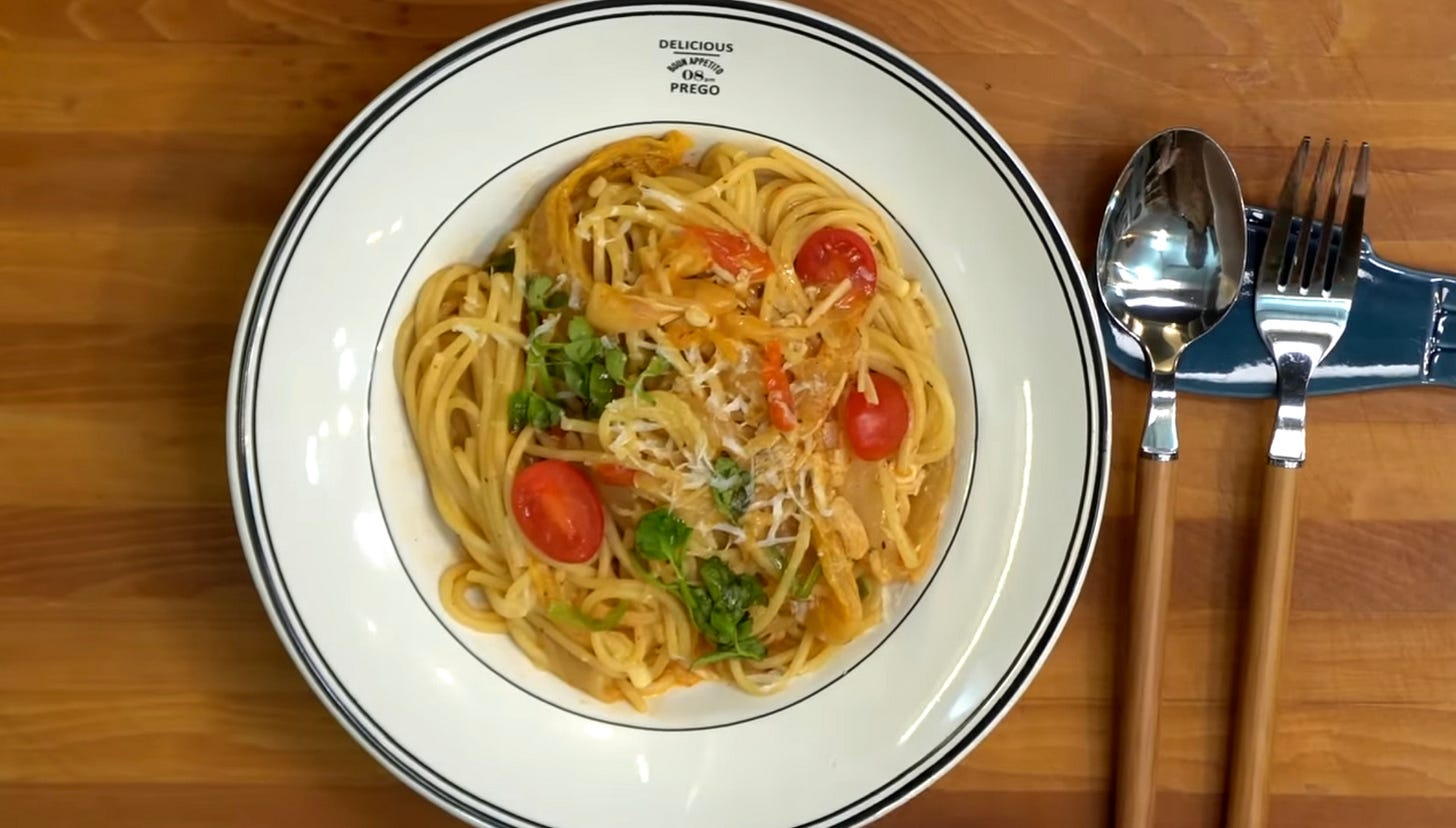안녕! It's Ari, your talkative Korean friend and weekend reminder 🎉 Today’s newsletter is about a kimchi pasta recipe, Koreans’ karma, Michelle Yeoh’s Oscar acceptance speech, and more. Let’s start!
🎧 You can listen to me read and being sarcastic on Spotify, Apple Podcasts, or others.
Kimchi One-Pan Pasta

Do you have leftover or sour kimchi in your refrigerator? Don’t throw it away because you can make a great pasta with it in an incredibly easy way. Let me introduce you to kimchi one-pan pasta, which is a dish you totally deserve for surviving the week. Here’s the recipe I found on YouTube for this dish.
For 2 servings,
Put 2 servings of pasta noodles, chopped kimchi (150g), chopped onions (3/4), sliced garlics (4 cloves), chopped enoki mushrooms (150g), halved cherry tomatoes (10), chopped fresh basil (or dried basil), and a palm-sized slice of dried kelp (can be omitted) in a pan.
Sprinkle some pepper and 2 pinches of salt and add a tablespoon of sesame oil and 2 tablespoons of olive oil.
Pour 900ml of water in a pan to boil.
When the noodles are cooked, put out the fire, add chopped scallions, and mix all ingredients well until the noodle absorbs most of water.
Sprinkle parmesan or any other cheese you want and add halved cherry tomatoes (2). Bon appétit! 😋
The 69-Hour Workweek

What if you start working at a new job and your employer gives you two options?
Working 69 hours & 6 days a week (11.5 hours a day) 😱
Working 64 hours a week (it’s possible that you work for 64 consecutive hours) 😱😱
You would probably think the employer is crazy and choose not to work this job. But what if they are the only options you’ll get from any company in your country because it’s the government’s new policy?
South Korean government recently announced “Working Hour System Reform Plan” which gives Korean employees the exact two options. Under the new plan, the current limit on weekly working hours of 52 hours is lifted and the limit is extended to 69 hours. And it “allows” workers to choose between working maximum of 69 hours & 6 days a week and 64 hours a week.
The government said the reform plan is “for” workers since it will allow workers to work in concentration mode and then rest for a long time. Under the new plan, “working time savings account system” will be created. The system will allow workers to save 1.5 hours of vacation per each 1 hour of overtime, night hour, and holiday working. Many newspapers that are friendly to corporations praised the new plan saying that it “can make 4-day workweek,” E.g. getting two 4-day weeks after two 64-hour weeks 😇 “allows workers go vacation in Jeju island for a month” and “gives workers more options to choose working hours.” between 69 and 64 😇 However, they don’t mention that it is already difficult for employees to take even just a few days off because most of companies are understaffed or working for too long can put people’s health at serious risk.


Koreans are, of course, furious about the new policy. They are saying things like, “People can only go on vacation while they’re alive”👆 or “We’ll end up going to work and then the hospital, and then work again, and then the hospital, and eventually die.”
But it seems too late to complain. A year ago, Koreans had two options, one presidential candidate whose campaign promise was 4-day workweek and another presidential candidate who claimed workers should be able to work 120 hours a week. And they chose the candidate who supported working 120 hours a week. Now, Koreans are facing the harsh consequences of their choice and I may say it's just karma. 👈🎧
Mini Korean Lesson) To the Bullies
Let’s learn about a Korean word meaning “karma,” and an example sentence. So the closest Korean word to “karma” is,
업보 /eob-bbo/
This word originated from Buddhism and refers to the price or punishment for bad actions done in this and previous lives. So it means “bad karma” rather than “good karma.” Koreans usually use this word when they see a person being punished for their sins or bad actions. For example, in “The Glory: Part 2,” a heroine avenges her high school bullies after many years of preparation. When you watch the bullies getting caught up with their bad karma, you can say this sentence to them,
이게 다 니 업보야. “It’s a result of your bad karma.”


One last thing to share is how a Korean television network reported Michelle Yeoh’s Best Actress Oscar acceptance speech. The 60-year-old actress said, “Ladies, don't let anybody ever tell you that you are ever past your prime.” 🥹 SBS, one of three biggest Korean television networks censored the word, “ladies,” from her speech both on video and subtitle 👆 (In subtitle, they replaced “ladies” with 여러분, meaning “you” in plural.) After the censored video went viral and met with severe criticisms, the network claimed they censored the word because they believed her message “was not necessarily applicable only to women.” when it clearly was 🫠 Sadly, as one tweet points out, this incident “tells you everything about how South Korea sees and treats women.”
Thanks for reading! And pray for Korean workers. If you liked my newsletter, like ❤️, leave a comment, share, or make a donation to support me. It’ll help me keep writing! See you next week. 안녕!




Made kimchi pasta for dinner. It was so easy to make and tasted very savory! Added a salmon filet for extra protein. Thanks for the delicious recipes!